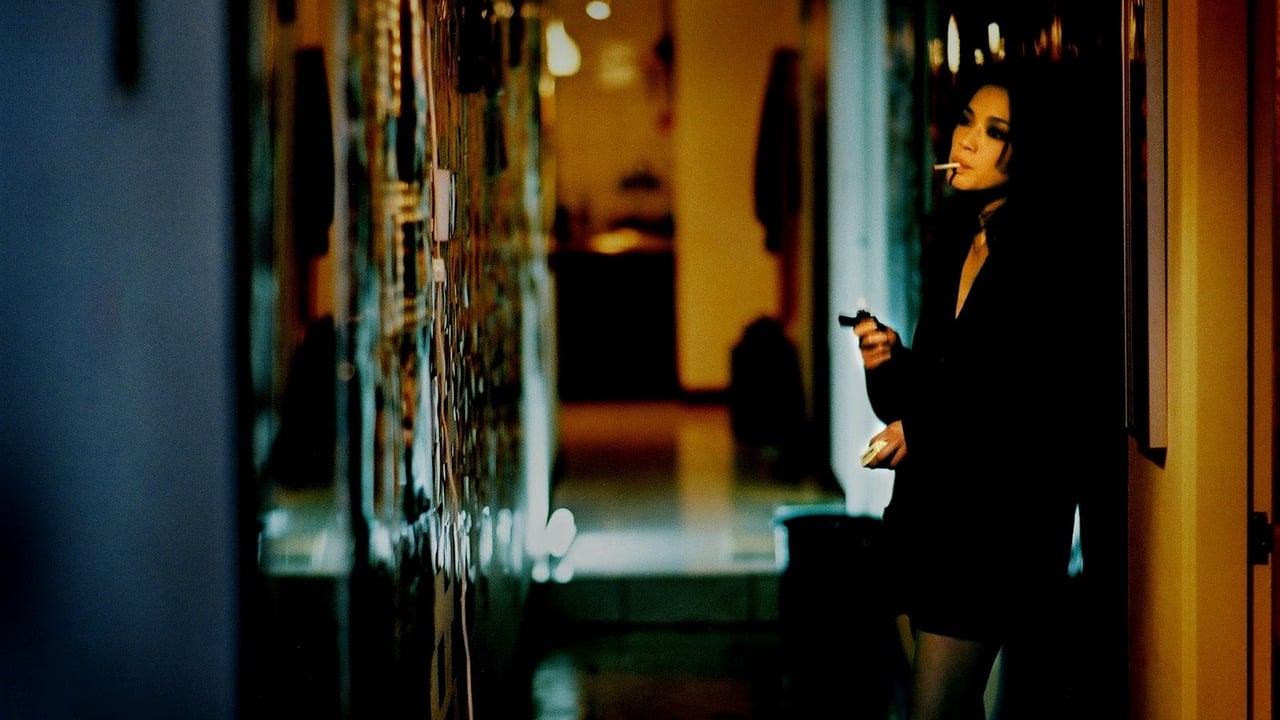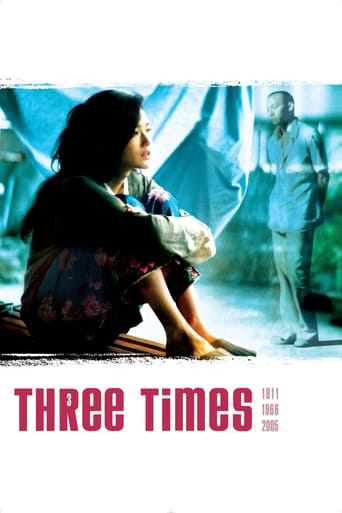

good film but with many flaws
... View MoreA lot of perfectly good film show their cards early, establish a unique premise and let the audience explore a topic at a leisurely pace, without much in terms of surprise. this film is not one of those films.
... View MoreA film of deceptively outspoken contemporary relevance, this is cinema at its most alert, alarming and alive.
... View More.Like the great film, it's made with a great deal of visible affection both in front of and behind the camera.
... View MoreThere are great aspects of Three Times, but overall the film falls short of entertaining. The camerawork is quite lovely, especially the long takes, as it gives the piece a very special rhythm. The characterization is meaningful yet shallow in all three stories, which makes it hard to connect thoroughly with the characters. The first story is fantastically charming, but the second is beautifully dull, and the third failed to bring this viewer back into the picture. Three Times is an art piece, and should be viewed as such. The majority of modern movie-goers would not enjoy this film, but it does have merit, and this reviewer can most accurately described it as an experiment in cinema.
... View MoreNominated for Palme d'Or at Cannes Film Festival in 2005, Hsiao-hsien Hou's Three Times is a moody exploration of love, freedom and youth. The movie unfolds in three separate stories which take place in three different time zones over a century in Taiwan, with the main roles in each story played by same two actors – Qi Shu and Chen Chang.In the first story – A Time for Love – set in 1966, Chen meets May in a bar while playing pool. They stay in touch when he joins the army, but when he comes back May doesn't work in the same bar anymore. So he seeks her to different places. In the second – A Time for Freedom – set in 1911, Mr. Chang is frequent visitor to a brothel where he keeps interacting with a singer. When he frees one of the other girls by providing financial help, the singer asks if he would help her too. The last story – A Time for Youth – set in 2005, shows a relationship of girl with a photographer and a bisexual singer.This is one movie where actually "nothing happens". There are long shots without any dialogue at all, camera just pondering on characters when they do trite stuff, where everything depends on whether you will get sucked into the day to day lives of these people. But even then when you find yourself hooked to the screen, and admire each shot for its perfection and at the same time you connect with the characters all of them being from radically different eras.The music plays a huge part in the movie and sets the gloomy mood of the movie throughout – especially in the second and third stories. In fact, in the second story, there is no spoken dialogue at all. Though you can see people speaking, all you hear is a long musical piece in the background, and you get to see what is spoken written on the screen like in a silent movie. The first story is played on the background of two soulful songs – Smoke Gets in Your Eyes by The Platters and Rain and Tears by Aphrodite's Child. I became an instant fan of these two songs. I would love to go back to watch this movie again just to listen to these songs with great visuals and atmosphere of love and longing.Qi Shu gives electrifying performances as May in the first story, the singer in the second, and as the girl torn between the loves of his boyfriend and a girl. Chen Chang is also brilliant – particularly in the first and last story. The best part of the movie is the direction, where Hou keeps you riveted for nearly two hours without much of any story. Overall, this is one of the best movies I have seen in recent which I would love to watch again and again.http://vishwas8317.blogspot.in/2012/12/threetimes.html
... View MoreWith all the great acclaim this film received, and with none other than Shu Qi starring in it, I was really looking forward to it. Unfortunately, it was a huge disappointment. And I'm someone who liked "Millennium Mambo," another Hou Hsao-Hsien/Shu Qi collaboration.Probably the most generous thing I can say about this movie is that it does not translate well for Western audiences.And since a number of people here are "voting" for which of the three stories worked the best for them, I'd have to go with the 1911 story.Shu Qi is one of the most beautiful women in the world, but even that couldn't make me enjoy how slow and boring this very long film was.
... View MoreA triptych film about love in different time periods. The first segment takes place in 1966, the second in 1911 and the third in 2005. Like all multiple-segment movies, the segments are of varying quality. People will of course prefer different segments. The first segment is simple and sweet. A man, about to embark on military duty, meets up with a girl who works in a pool hall. He falls in love with her, and writes her after he leaves. When he returns, he searches for her desperately, and they spend a too-short evening together. It's nice, but it doesn't amount to much. The 1960s American love songs strike me as completely antithetical to everything Hou has stood for in the past. I would be surprised if someone saw this and didn't call to mind Wong Kar-Wai. To be perfectly honest, I had a damn tough time paying any attention at all to the second segment. The story works within historical, cultural and political contexts that are not always easy to understand. For some odd reason, Hou decides to convey the dialogue as if it were a silent movie. It's a strange and pointless gimmick. 1911 is a tad too early to be thinking of any well-known silent cinema. I'm guessing that China had barely seen the technology yet. Plus, the segment is filmed just as the other two are, in splendorous colors (the photography is drop-dead gorgeous throughout). I'm not big on Hou, and I'm not especially big on silent cinema, either, so the cocktail did absolutely nothing for me. Oh, and that awful upscale-hotel elevator music is just unbearable! The third segment is by far my favorite, and probably my second favorite thing Hou has ever done. Possibly even the best; I'd have to re-watch Flowers of Shanghai. It's quiet and subtle, like all of Hou's films, but, as rarely happens with me in his cinema, I actually connected with the characters and the story. I don't know if I would have liked it if it were an entire feature, but at this length it worked quite well. Oh, and Shu Qi is a babe. She was also in Millennium Mambo. Kind of wish Hou would have let her make out with that girl in that last segment. Damn you Hou Hsiao-Hsien!
... View More